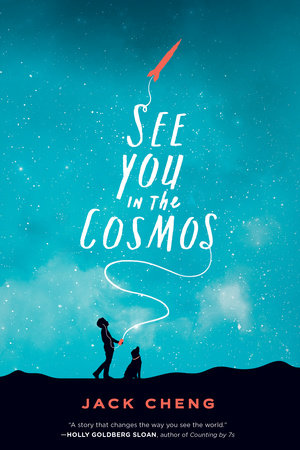See You in the Cosmos is Jack Cheng’s first novel for young readers, though its powerful story will surely resonate with older readers as well. The book revolves around Alex Petroski, an 11-year-old boy who journeys from Colorado to New Mexico, and Las Vegas to L.A., recording his experiences on a golden iPod that he hopes to launch into space. Alex uncovers many secrets on his trip, all of which will change the course of his life. This witty, passionate, and sometimes heart-wrenching story imparts valuable lessons — that goodness can prevail even in the darkest of times and that strength can be found in unexpected places. See You in the Cosmos demonstrates the importance of unconditional love and forgiveness in an unfair world, and serves as a reminder to never lose hope.
We were thrilled to chat with Jack Cheng to get an inside look at the inspiration behind his newest novel, and to learn what enabled him to craft characters that carry such a compelling message.
How were you able to so successfully capture the essence of an 11-year-old boy in your writing?
I take issue with books that don’t respect a kid’s intelligence, or that do the opposite — that make kids out to be the too precocious “wise child.” To me, real kids are smart in unexpected ways; they’re unintentionally profound. I think what also makes Alex sound authentic is his combination of bravado and naivety. He’s super smart about certain subjects, and he’s very confident in everything he knows (or thinks he knows), but there are also broad swaths of things he’s totally clueless about. That’s a good description of what I was like as an 11-year-old.
Where did you find inspiration for Alex, his family, and his friends?
I think of writing a novel as almost like experiencing a dream — it’s hard to know beforehand who will appear in it. Sometimes a character, or a certain kind of character, will recur in my stories without me fully understanding why. It’s only afterwards that I can go in and try to interpret the dream, and then I realize that, for instance, the way everything to Alex is either “good” or “SO good” comes from my Dad and from his more limited vocabulary as a non-native English speaker. That said, I firmly believe that fictional characters are as real as real people — they might remind you of someone you know, but they’re still their own person.
Do you have a passion for space and rockets like Alex?
I appreciate space and rocketry, but I’m not quite as obsessed with it the way Alex is. When I was Alex’s age I was interested in a lot of different things: baseball, art, computers, geography, Ninja Turtles… I will say that Alex and I share an enthusiasm for discovery, and we both have an openness to exploring new places. I’ve traveled quite a bit in my adult life — I’ve spent months in South America and Asia, and have been on road trips here in the U.S., including in the Southwest, where See You in the Cosmos takes place.
Do you personally believe in the goodness of people, including complete strangers?
I do. I think back to all the people who have helped me throughout the years — the teachers, mentors, friends, and even strangers — who seemed to come into my life or know exactly the right thing to say or do at the right time. I think we all have examples of people like that. And I think it’s that very believing in the goodness of others that’s important. Not only important, but essential. Our beliefs become our reality. When we operate from a place of fear and mistrust, we end up creating a society of fear and mistrust. And a society like that can’t last.
What would you like to say to kids that are experiencing a tough time at home?
I’m so sorry. I know what you’re going through can’t be easy. Whenever I’m having a tough time with something, I find it helpful to talk to someone who has an outside perspective on whatever I’m struggling with — someone like a friend, a sibling, a parent, a teacher, or a coach. Sometimes they’ll have already been through what I’m going through, and they’ll help me understand what’s happening, and what might be next. Other times it’s good just to have someone who’ll listen.
What are you hoping readers take away from this novel?
I’m hoping that readers will see that there doesn’t always have to be a villain. That the characters who seem to be antagonists are just other human beings trying to do their best. That there are great possible adventures that don’t involve battling an enemy or group of enemies. That the very fact that we’re alive on this planet, together with other human beings, means that we’re already on the greatest of adventures.
Born in Shanghai, Jack Cheng came to the U.S. when he was five, and grew up in metropolitan Detroit. After nearly a decade in New York City working in advertising and tech, he returned to Detroit to pursue new projects that integrate his professional experience with his passion for creativity and innovation. Visit him online at jackcheng.com and subscribe to “Sunday,” his weekly letter on writing, creative work, and being a human.

